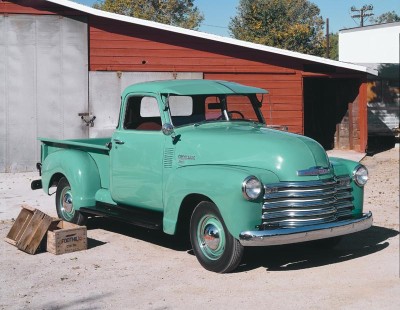During the summer of 1947 I fell deeply in love. His name was Chicken Grieser (rhymes with freezer), and he played shortstop for Waldvogel’s Hardware three times a week at Ruilhy Park. He drove his truck over to our town from Stryker where somebody told me he lived. All that summer I sat on the top bleacher to get the best look at Chicken and where he wouldn’t see me looking. Although I hoped he would. I hoped he’d look up to where I was and wink or grin the way he did after he tagged out a runner headed for third. Then, after the game he would wander over to where I was just getting off the bleachers and say something like, “Wanna ride home?” I would of course say yes and he would drive us out to Goll’s Woods where I had heard a lot of funny business went on.
I would have liked him just a little taller so that I would have to look up at him, not over at him when we walked anywhere. But his muscles made up for anything that might have been missing elsewhere. Plus his blonde hair. Plus his tan, especially on his left forearm which he hung out the window of his truck, t-shirt sleeve rolled up to hold his pack of Chesterfields. The hair on his arm was golden and glinted in the sun.
Chicken’s best friend was named Leon. My best friend was named Harriet. Harriet was the only person who knew I had fallen for Chicken. In order to bring about an actual meeting between the two of us she took up with Leon who was tall but sort of stringy and played right field which tells you how good an athlete he was. The plan was that Harriet would ride in Leon’s truck with him and then come to my house and tell me whether or not my love could ever possibly be returned. That was what she was supposed to do; I don’t know what she actually did, though, because while I continued to sit on the top bleacher, Chicken’s eyes remained on the line between second and third base.
I poured out my woes and my hopes in my diary: “Saw Chicken today heading down Walnut. He’s so cute!” and “I think he looked at me just as I was heading into the park. He didn’t say anything but he looked like he would have liked to.” And “Harriet thinks Leon told Chicken about me. Oh no! I’m so embarrassed!” And so on.
One day near the end of summer my mother called us all to come in and wash our hands for supper. Clean as could be, we took our places at the table. My brother, age 12, sat down with his usual smirk, one hand behind his back. “Put down whatever you’re holding,” said our mother, “and sit up straight.” My brother placed on the table my diary. I screamed and lunged for it, upsetting my glass of water as I did. My brother held the diary up high and waved it around for everyone to see. My father brought his fist down on the table, a sure sign that he meant business. “Cease and desist with this nonsense,” he roared. We sat up straight as we could while our mother mopped up the water from the table. We didn’t say anything. Until my brother opened my diary and began to read: “Saw Chicken today…,” he began. I screamed again but stayed where I was. My father said, “Hand it over.” My brother did. My father handed it to me: “Put this where it belongs.” I was excused from the table to take the diary to a hiding place new and impenetrable to the likes of anyone but myself. As I climbed the stairs I heard from the diningroom, “Young man, explain yourself.”
I smiled, content in the knowledge that my brother would never be able to explain himself as anything but the cruel, mean and nasty boy he was. He was falling out of my father’s favor with each stair I climbed. It sort of made up for Chicken’s absence in my life once school started. And for never having been asked to climb into his pickup and for never having exchanged so much as a “hi.” And for not knowing what color his eyes were because he never once looked at me. And for Harriet’s defection to Leon fulltime.
The following summer Chicken was nowhere to be seen. But that was all right because by then I was in love with Babe Bernath, and my best friend was Babe’s sister Rose. I wore the key to my diary around my neck at all times. It was golden and glinted in the sun.
©Jane Juska, 2010
Jane Juska retired from 40 years of teaching in 2000 A. D. held together by what she had learned from BAWP in 1982 and 1983 and by the people she met there. Since then, she has written 5 books, two of them published, 3 desperate for homes, a new one in gestation. Writing can be fun, especially if you don’t have any papers to grade.

March 8, 2010 at 6:29 am
Dear Jane,
I love this piece: a morsel of summertime teenage unrequited love/lust. Chicken, Babe… I wonder who was next.